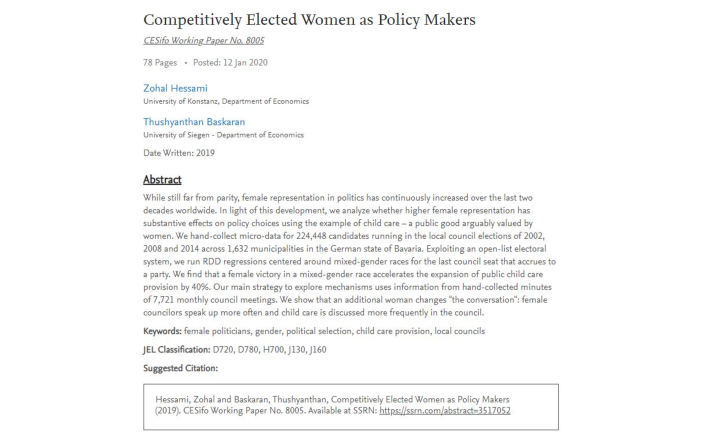Competitively elected women as policy makers
Source: SSRN
While still far from parity, female representation in politics has continuously increased over the last two decades worldwide. In light of this development, we analyze whether higher female representation has substantive effects on policy choices using the example of child care – a public good arguably valued by women. We hand-collect micro-data for 224,448 candidates running in the local council elections of 2002, 2008 and 2014 across 1,632 municipalities in the German state of Bavaria. Exploiting an open-list electoral system, we run RDD regressions centered around mixed-gender races for the last council seat that accrues to a party. We find that a female victory in a mixed-gender race accelerates the expansion of public child care provision by 40%. Our main strategy to explore mechanisms uses information from hand-collected minutes of 7,721 monthly council meetings. We show that an additional woman changes "the conversation": female councilors speak up more often and child care is discussed more frequently in the council.
Click here to see the report.

While still far from parity, female representation in politics has continuously increased over the last two decades worldwide. In light of this development, we analyze whether higher female representation has substantive effects on policy choices using the example of child care – a public good arguably valued by women. We hand-collect micro-data for 224,448 candidates running in the local council elections of 2002, 2008 and 2014 across 1,632 municipalities in the German state of Bavaria. Exploiting an open-list electoral system, we run RDD regressions centered around mixed-gender races for the last council seat that accrues to a party. We find that a female victory in a mixed-gender race accelerates the expansion of public child care provision by 40%. Our main strategy to explore mechanisms uses information from hand-collected minutes of 7,721 monthly council meetings. We show that an additional woman changes "the conversation": female councilors speak up more often and child care is discussed more frequently in the council.
Click here to see the report.